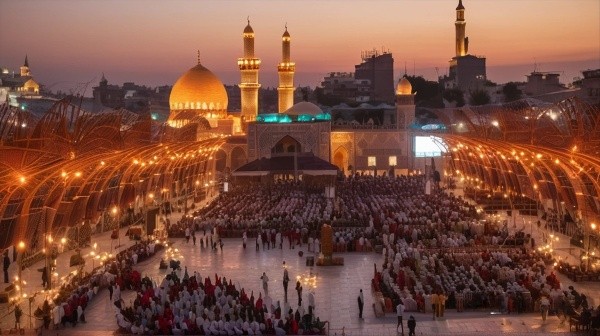Iran’s Plan to Strike Back Against the U.S.
Iran’s Military Preparations Following U.S. Attacks
Loading...

Millions of Muslims from dozens of countries are converging on the Iraqi holy city of Karbala to commemorate Arba’een, the 40th day after the martyrdom anniversary of Imam Hussein (AS), the third Shia Imam.
A Global Gathering of Faith
This year, millions of Muslims from various countries are making their way to the Iraqi city of Karbala to observe Arba'een, a significant religious event that marks the 40th day after the martyrdom anniversary of Imam Hussein (AS), the third Shia Imam. The pilgrimage, which takes place on August 25, 2024, has seen an influx of devotees from nations such as Iran, Afghanistan, Azerbaijan, Bahrain, Kuwait, Pakistan, and Saudi Arabia. For at least two weeks leading up to this day, pilgrims have been arriving in Karbala, located approximately 100 kilometers (62 miles) southwest of Baghdad, with many traveling on foot to participate in this monumental gathering.
The Journey to Karbala
Pilgrims embark on their journey carrying their belongings in backpacks or bags, often balancing them on their heads as they walk towards Karbala. Many young men bring tents to sleep on the streets, showcasing the communal spirit and dedication of those participating in this pilgrimage. According to Iran's Arba'een Central Headquarters, over 3.32 million Iranian nationals have crossed into Iraq through various land border crossings, and the process has been reported to be smooth and organized.
The Arba'een pilgrimage is not just a physical journey; it is a profound spiritual experience. Pilgrims seek to touch the gilded grille surrounding Imam Hussein’s tomb and often slip messages through the bars, expressing their hopes, prayers, and tributes to the martyr. This act symbolizes a deep connection to their faith and the legacy of Imam Hussein, who is revered for his stand against tyranny.
Historical Significance of Arba'een
The significance of Arba'een is rooted in the tragic events of 680 AD, when Imam Hussein and his 72 companions were martyred in the Battle of Karbala. This battle was a pivotal moment in Islamic history, representing the struggle for justice against oppression. Imam Hussein's refusal to pledge allegiance to the Umayyad caliph Yazid I, unjust and immoral, led to his martyrdom. The commemoration of Arba'een serves as a reminder of the values of sacrifice, justice, and resistance against tyranny that Imam Hussein embodies.
A Unifying Event
Every year, Arba'een attracts millions of participants, making it one of the largest annual religious gatherings in the world. The event transcends national and ethnic boundaries, uniting Shia Muslims in a shared expression of grief and reverence. The pilgrimage has grown significantly in recent years, with numbers swelling from two million participants in 2003 to an estimated 21 million in recent years, reflecting the resilience and devotion of the Shia community.
Despite the challenges posed by intense heat, sandstorms, and security concerns, pilgrims continue to flock to Karbala. The Iraqi government has implemented tight security measures to ensure the safety of participants, particularly in light of potential threats from extremist groups. The atmosphere in Karbala during this time is one of solidarity and devotion, as people from diverse backgrounds come together to honor the memory of Imam Hussein.
Conclusion
As millions of pilgrims converge on Karbala for Arba'een, the event stands as a powerful testament to the enduring legacy of Imam Hussein and the values he represents. The pilgrimage not only commemorates a historical event but also fosters a sense of unity and purpose among Muslims worldwide. The journey to Karbala is more than a physical trek; it is a profound spiritual pilgrimage that continues to inspire and mobilize millions in their quest for justice and truth.
BMM - MBA
Iran’s Military Preparations Following U.S. Attacks
Troops remain in five strategic locations, raising fears of renewed tensions and long-term occupation.
Opposition forces have taken control of the capital after a significant offensive. Here is how it unravelled.
